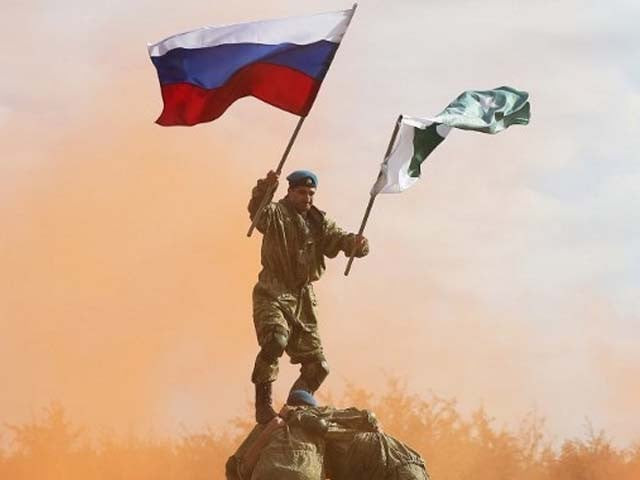This year’s Russian-Pakistani joint anti-terrorist drills just commenced in the southern Krasnodar Region. They were preceded by Chairman of the Pakistani Joint Chiefs of Staff Committee General Nadeem Raza meeting with his Russian counterpart Chief of the Russian General Staff and Deputy Defence Minister Army General Valery Gerasimov in Moscow last week. The Russian host praised his guest’s country by remarking that “Pakistan is one of the few countries with which military cooperation is developing very actively this year, despite the complex epidemiological situation.” The two military leaders also discussed their participation in the SCO’s multilateral drills earlier this year as well as bilateral naval interactions.
Russian-Pakistani military relations have been gradually improving over the years, driven primarily by shared Afghan-emanating terrorist and other unconventional security threats such as so-called “Weapons of Mass Migration”. India is very sensitive about them though, but Russia hasn’t done anything to infringe upon its national security interests. Ties remain mostly concentrated in the anti-terrorist sphere through yearly joint military drills rotating between each other’s territories and the provisioning of relevant equipment. Russian Foreign Minister Sergey Lavrov pledged to continue the latter during his historic trip to Islamabad in April, which was set against the backdrop of the US’ then-impending withdrawal from Afghanistan.
Their fast-moving rapprochement of recent years is endorsed at the highest levels of their leaderships. “The Khan-Putin Phone Call Was A Defining Moment In Pak-Russia Relations” after the Russian leader called his Pakistani counterpart in late August to discuss the latest events in Afghanistan. Significantly, US President Joe Biden had yet to call Prime Minister Khan and still hasn’t to this day in spite of America depending on Pakistan to ensure its withdrawal from that neighbouring country. This was the first time that Russia showed that it relies on Pakistan to advance its regional national security interests, which testified to the trust that had been built between their respective governments.
This was achieved not only as a result of their political coordination on the Moscow peace process for Afghanistan, their earlier agreement to construct the Pakistan Stream Gas Pipeline (PSGP), or the possibility of February’s agreement to construct a Pakistan-Afghanistan-Uzbekistan (PAKAFUZ) railway enabling Russia to finally reach the Indian Ocean like it’s aimed to do for centuries already, but mostly due to their “military diplomacy”. This concept refers to the varied use of military means to advance strategic ends. In the Russian-Pakistani context, it relates to their increasingly close military coordination for containing Afghan-emanating threats, which importantly helped them overcome the bitter legacy of their 1980s proxy war in that country.
Without having pragmatically come together in pursuit of these shared national security interests, Russia and Pakistan might probably have remained rivals instead of the promising potential strategic partners that they are today. Their “military diplomacy” vis-a-vis Afghanistan also occupies a special significance for their respective governments. Military and intelligence forces still play major roles in formulating their states’ relevant policies so more trust-based interactions between them and their counterparts played a much greater role in their on-going rapprochement than the earlier mentioned political, energy, and connectivity factors. Had it not been for the newfound trust between these military-intelligence forces, those other policies would have floundered.
The reported Islamabad intelligence summit in mid-September which brought together the Russian, Chinese, Iranian, and a few Central Asian chiefs showed just how far the trust between their military-intelligence forces had come. There’s no longer any doubt that Russia’s respective representatives nowadays consider their Pakistani counterparts to be trusted partners instead of the rivals that they used to be perceived as otherwise they wouldn’t have dispatched their top spy to that South Asian state’s capital for multilateral consultations on Afghanistan. In light of their exceptional relations as of late, it’s natural that General Gerasimov praised Pakistan for actively developing military cooperation with Russia over the past year despite the pandemic.
This unprecedented pronouncement will certainly attract the attention of India, the US, and other interested observers, but they needn’t fear anything since Russian-Pakistani military ties aren’t aimed against any third country. Although they first began to thaw due to shared anti-terrorist threats emanating from Afghanistan, they’ve since evolved from relevant joint drills to naval interactions and multilateral exercises under the SCO banner. The trust built between their military-intelligence representatives laid the bedrock for the further development of bilateral relations beyond these spheres and into the political, energy, and connectivity ones. The comprehensive expansion of their relations embodies multipolar trends and thus benefits all of Eurasia.



COMMENTS
Comments are moderated and generally will be posted if they are on-topic and not abusive.
For more information, please see our Comments FAQ